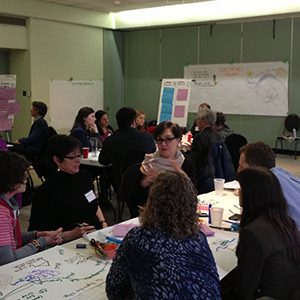Food Security Groups Agree on Cecil Street Statement
 On March 25, 2015, twenty Canadian community food sector leaders, academics engaged in food insecurity research, and other professional and non-governmental stakeholders concerned with food insecurity, gathered to discuss the latest research on household food insecurity, and to examine potential areas of collaboration. The meeting was convened by the PROOF Research project (supported by the Canadian Institutes of Health Research, this 5 year project has the goal to identify attributes of effective policy approaches to improve household food insecurity in Canada), in collaboration with Food Secure Canada.
On March 25, 2015, twenty Canadian community food sector leaders, academics engaged in food insecurity research, and other professional and non-governmental stakeholders concerned with food insecurity, gathered to discuss the latest research on household food insecurity, and to examine potential areas of collaboration. The meeting was convened by the PROOF Research project (supported by the Canadian Institutes of Health Research, this 5 year project has the goal to identify attributes of effective policy approaches to improve household food insecurity in Canada), in collaboration with Food Secure Canada.
Attendees came from a variety of perspectives - research, food banks, community food projects, food security in northern communities, municipal food policy councils, provincial networks, school food programs and more - and participants were engaged in initiatives and projects that span different objectives with different populations, such as seeking to raise awareness about where food comes from, promoting healthy eating, supporting small and medium sized farmers and fishers, encouraging farm to table connections, and generally empowering people to exercise their power as citizens for social change.

The meeting was a very interactive and constructive sharing of perspectives and approaches that resulted in a shared understanding of the problem of food insecurity in Canada and some agreement on the direction policy work needs to take in order to reduce food insecurity levels.
Participants agreed that all Canadians have the right to food, as an essential part of enjoying their right to an adequate standard of living, as recognized in international law. Yet 4 million Canadians live with varying levels of food insecurity severity and struggle to consume an adequate diet acquired in a socially acceptable way. The root cause of food insecurity in Canada is insufficient income. The primary policy response to food insecurity, therefore, should be to raise the income of people to levels that permit them to purchase adequate food for themselves and their families. The people and organizations present at this meeting are committed to jointly exploring and advocating for appropriate policy responses to food insecurity with a focus on income-based solutions.
Several participants at the meeting committed to working to raise the profile of poverty and food insecurity in the upcoming federal election campaign, but agreed that meaningful policy change on income-based solutions to food insecurity would require a long-term commitment and partnership between researchers and the community sector.
Participants at the meeting included:
- Log in to post comments

